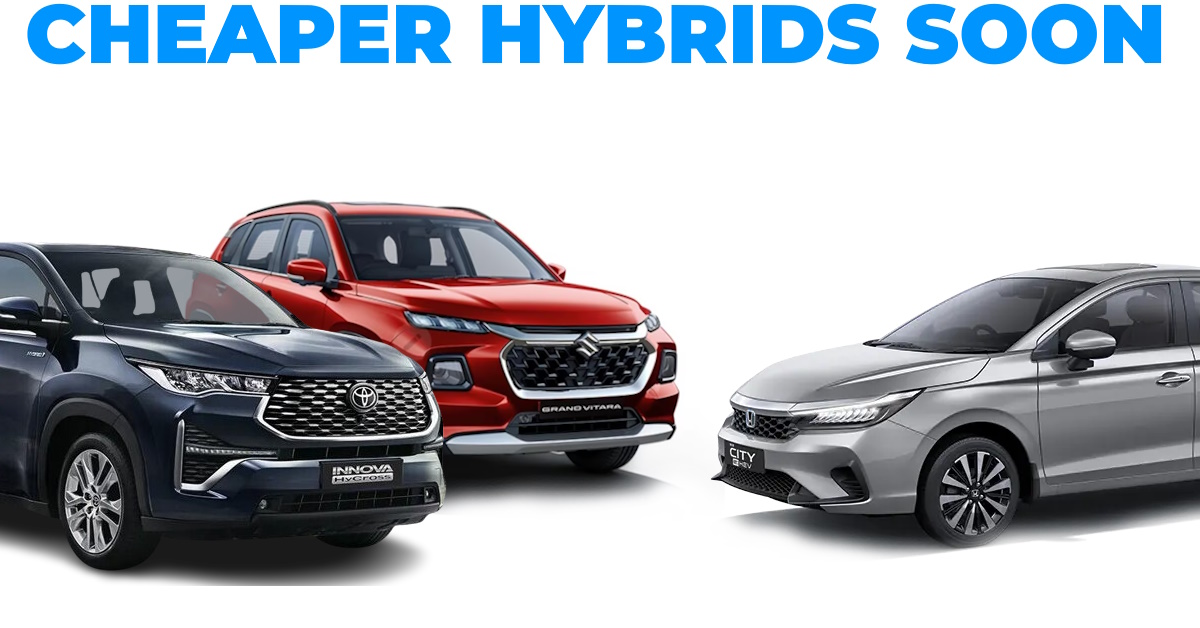The Indian government’s push for electric vehicles (EVs) has largely bypassed hybrids, aiming for a direct shift to battery-powered cars. However, major automakers like Honda, Toyota, and Maruti Suzuki have introduced hybrid models in India recently.
While these hybrids offer both gasoline and electric propulsion for better fuel efficiency, their price tag is significantly higher compared to traditional gasoline-powered vehicles. This begs the question: can hybrids become more affordable for Indian consumers? Let’s explore the possibilities.

Why Hybrid Cars Cost More in India
Hybrid cars combine a gasoline engine with an electric motor and battery pack. This technology offers several advantages, including:
Improved fuel efficiency: Hybrids achieve significantly better fuel economy compared to gasoline-only vehicles.
Reduced emissions: Hybrids contribute to lower overall emissions compared to traditional gasoline cars.
Smoother driving experience: Hybrids offer a smooth and responsive driving experience due to the combination of electric and gasoline power.
However, the key component that drives up the cost of hybrids is the battery pack. Battery technology is still evolving, and manufacturing these packs remains expensive. Additionally, unlike EVs that benefit from government incentives, hybrids currently lack similar support in India. This translates to a higher tax bracket for hybrids compared to EVs, further inflating the final price for consumers.
3 Ways Hybrid Cars Could Become More Affordable in India
Despite the current cost barrier, there are potential avenues for making hybrids more accessible in the Indian market:
Reduced Government Taxation
The Indian government currently levies a 48% GST (Goods and Services Tax) on hybrids, while EVs enjoy a significantly lower tax rate of 5%. As mentioned earlier, Minister of Road Transport & Highways Nitin Gadkari recently proposed reducing the GST on hybrids to 12%.
This move, if implemented, would significantly lower the price gap between hybrids and gasoline cars. A lower tax bracket could translate to substantial savings for potential hybrid buyers.
Lower Material Costs
As the demand for EVs and hybrids increases globally, the technology behind battery production is constantly evolving. This leads to improvements in efficiency and a potential decrease in production costs.
The same principles apply to hybrid batteries. With increased demand and technological advancements, the cost of battery packs used in hybrids is expected to come down over time. This decrease in material costs will eventually reflect lower car prices for consumers.
Discount Incentives
Tax reductions and lower material costs are long-term solutions. In the short term, additional financial incentives could encourage buyers to choose hybrids. These incentives could come from two sources:
Government subsidies: The government could introduce targeted subsidies specifically for hybrid car purchases. This would directly reduce the upfront cost for buyers.
Manufacturer discounts: Automakers themselves could offer attractive discounts on hybrid models to stimulate demand and bridge the price gap with gasoline cars. Additionally, manufacturers could incentivize trade-in programs, offering higher value for old gasoline or diesel vehicles exchanged for hybrids.
By implementing a combination of these strategies, hybrid cars could become a more attractive option for a wider range of Indian consumers.
Will Hybrids Become the Perfect Middle Ground?
With their blend of improved fuel efficiency and lower emissions compared to gasoline cars, hybrids could potentially offer a sweet spot for Indian consumers hesitant to fully embrace pure EVs due to factors like range anxiety or limited charging infrastructure.
However, the success of hybrids hinges on overcoming the current price barrier. The factors discussed above, if addressed effectively, could pave the way for a more affordable hybrid market in India.
FAQs
Q: Are hybrid cars good for India?
A: Hybrid cars can be a good option for Indian consumers who prioritize fuel efficiency and lower emissions, but are hesitant about the limitations of pure EVs like range and charging infrastructure.
Q: Why are hybrid cars so expensive in India?
A: The high cost of battery packs and the lack of specific government incentives for hybrids contribute to their higher price tag compared to gasoline cars.
Q: Will hybrid cars become cheaper in India?
A: There’s potential for hybrid prices to decrease in the future. Factors like reduced GST, lower battery material costs, and manufacturer discounts could contribute to increased affordability.
Q: Are there any government incentives for hybrid cars in India?
A: Currently, there are no specific government incentives for hybrid cars in India. However, proposals for reduced GST on hybrids have been مطرح (mutabaqah – proposed).




